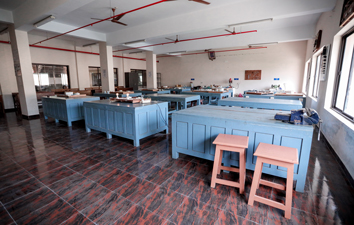 Electrical workshop equips the students with basic concepts of different electrical wiring schemes, measurement of various electrical parameters and identification of different types of fuses, fuse carriers, cables, switches, MCB, ELCB,MCCB etc. with ratings and its usages. It also gives students a concrete idea on house wiring, backup power supply including inverter and battery.
Electrical workshop equips the students with basic concepts of different electrical wiring schemes, measurement of various electrical parameters and identification of different types of fuses, fuse carriers, cables, switches, MCB, ELCB,MCCB etc. with ratings and its usages. It also gives students a concrete idea on house wiring, backup power supply including inverter and battery.
Electrical & Electronics Engineering
lab facilities
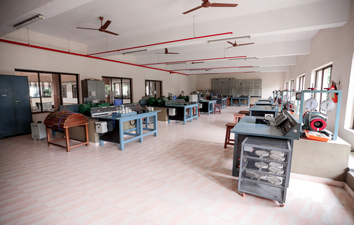 Electrical Machines lab is branded for its state-of- the art facilities. With sufficient number of ac and dc machines, it is capable of conducting lab sessions for two batches at a time. The objective of this lab is to impart a deep knowledge about characteristics and behavior of the dc and ac machines, transformers, synchronous and asynchronous machines and equip them with experimental skill. It also plays a key role in familiarizing students with the constructional details of different types of machines, working principle and their performance. This lab consists of dc machine, induction motors, induction generators, alternators, synchronous motors etc. Well established with all kinds of motors, generators and transformers this is the core lab for the Electrical Engineering branch and supports the labs of mechanical engineering branch.
Electrical Machines lab is branded for its state-of- the art facilities. With sufficient number of ac and dc machines, it is capable of conducting lab sessions for two batches at a time. The objective of this lab is to impart a deep knowledge about characteristics and behavior of the dc and ac machines, transformers, synchronous and asynchronous machines and equip them with experimental skill. It also plays a key role in familiarizing students with the constructional details of different types of machines, working principle and their performance. This lab consists of dc machine, induction motors, induction generators, alternators, synchronous motors etc. Well established with all kinds of motors, generators and transformers this is the core lab for the Electrical Engineering branch and supports the labs of mechanical engineering branch.
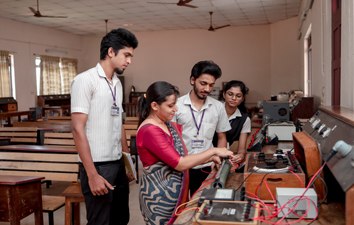 The aim of the Measurements Laboratory is to emphasize the students with an ample work experience in the measurement of different quantities and also the technical know-how in handling the instruments involved. It also helps to train the students about calibration of various instruments and to give exposure to bridges and potentiometers. This lab is well equipped with precision bridges and meters.
The aim of the Measurements Laboratory is to emphasize the students with an ample work experience in the measurement of different quantities and also the technical know-how in handling the instruments involved. It also helps to train the students about calibration of various instruments and to give exposure to bridges and potentiometers. This lab is well equipped with precision bridges and meters.
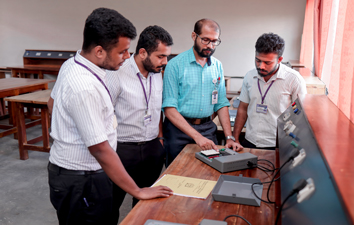 Microprocessors & Microcontroller lab imparts an excellent practical exposure to the students in the field of microprocessor/microcontroller family of processors. Along with 8085 & 8051 hardware trainer kits and its interfacing peripherals, modern simulation tools to facilitate the experimentation as per curriculum as well as for aiding the project work are also facilitated. This Laboratory plays a key role in augmenting their knowledge towards the latest trends and technologies of the modern world.
Microprocessors & Microcontroller lab imparts an excellent practical exposure to the students in the field of microprocessor/microcontroller family of processors. Along with 8085 & 8051 hardware trainer kits and its interfacing peripherals, modern simulation tools to facilitate the experimentation as per curriculum as well as for aiding the project work are also facilitated. This Laboratory plays a key role in augmenting their knowledge towards the latest trends and technologies of the modern world.
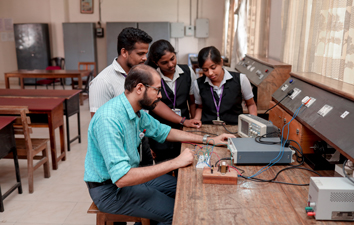 The Power Electronics Research Lab has state-of-the art equipments, instruments and computational facilities for research in power electronics, machines and their control. This laboratory introduces the student to measurement and simulation of important operating characteristics of power electronic circuits and power semiconductor devices. Prime Emphasis is given on devices, circuits, gating methods and power quality. The laboratory infrastructure can accommodate upto 30 under graduate students at a time. Facilities include computers and software like PSpice, MATLAB etc. for students’ computational needs. Major Equipments in the lab comprises of Digital Storage Oscilloscopes, DC power supplies, Inverters, Converter Modules, Function Generators, Resistive Loads etc.
The Power Electronics Research Lab has state-of-the art equipments, instruments and computational facilities for research in power electronics, machines and their control. This laboratory introduces the student to measurement and simulation of important operating characteristics of power electronic circuits and power semiconductor devices. Prime Emphasis is given on devices, circuits, gating methods and power quality. The laboratory infrastructure can accommodate upto 30 under graduate students at a time. Facilities include computers and software like PSpice, MATLAB etc. for students’ computational needs. Major Equipments in the lab comprises of Digital Storage Oscilloscopes, DC power supplies, Inverters, Converter Modules, Function Generators, Resistive Loads etc.
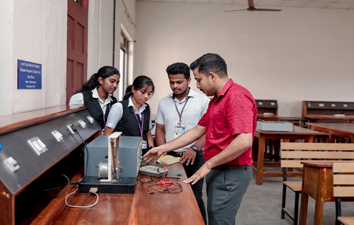 The intention of the Control system laboratory is to impart sound knowledge in the basic concepts of linear control theory and design of control system, to understand the representation of the transfer function models of different systems, to provide sufficient knowledge in the time response of systems and steady state error analysis, to offer basic knowledge in obtaining the open loop and closed loop frequency responses of systems and to understand the concept of stability of control system and methods of stability analysis. It also helps the students to study the compensation design for a control system. The design and implementation of control theory is done using MATLAB software to work out the experiments for open loop and closed loop systems. The lab is well equipped with MATLAB, LABView, PSpice software, AC servomotors, Synchro pair, inverted pendulum, Programmable Logic Controllers (PLC), Lag-Lead Compensators, etc. to conduct various experiments for the sixth semester, EEE students.
The intention of the Control system laboratory is to impart sound knowledge in the basic concepts of linear control theory and design of control system, to understand the representation of the transfer function models of different systems, to provide sufficient knowledge in the time response of systems and steady state error analysis, to offer basic knowledge in obtaining the open loop and closed loop frequency responses of systems and to understand the concept of stability of control system and methods of stability analysis. It also helps the students to study the compensation design for a control system. The design and implementation of control theory is done using MATLAB software to work out the experiments for open loop and closed loop systems. The lab is well equipped with MATLAB, LABView, PSpice software, AC servomotors, Synchro pair, inverted pendulum, Programmable Logic Controllers (PLC), Lag-Lead Compensators, etc. to conduct various experiments for the sixth semester, EEE students.
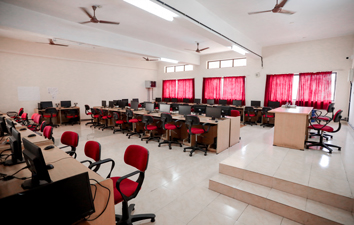 This lab intends to develop computer aided drafting of electrical machines and lay-out of various electrical installations. Students will be able to get familiarised with 2D drawing in Auto CAD, designing and drawing of different types of dc and ac windings and machines. Electrical CAD lab offers an opportunity to prepare schematic drawing of indoor and outdoor substation, main switch board with supplies from a Transformer and Standby DG set.
This lab intends to develop computer aided drafting of electrical machines and lay-out of various electrical installations. Students will be able to get familiarised with 2D drawing in Auto CAD, designing and drawing of different types of dc and ac windings and machines. Electrical CAD lab offers an opportunity to prepare schematic drawing of indoor and outdoor substation, main switch board with supplies from a Transformer and Standby DG set.
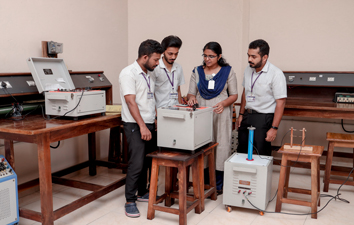 This lab is equipped with simulation software MATLAB and various testing kits. In MATLAB, the
This lab is equipped with simulation software MATLAB and various testing kits. In MATLAB, the
undergraduate students conduct load flow studies, short circuit studies and simulate various power
system experiments. The training kits like high voltage testing, transformer oil testing; CT PT
equipment’s are used to do various testing experiments in power system hardware lab.
Training and Placement Cell
A fully-fledged Training & Placement Cell is working towards better opportunities for its students and bridges the gap between prospective employer and candidate.





































































































